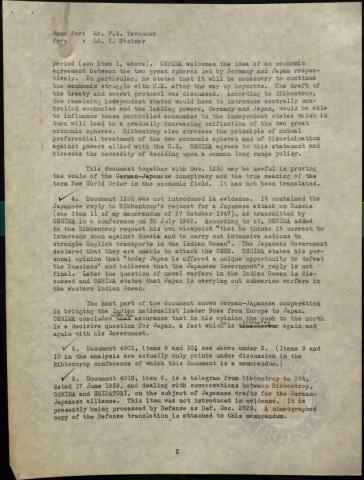
Page 2
| Parent | Examination of Documents Results November 3, 1947 |
|---|---|
| Date | 28 November 1947 |
| Language | English |
| Collection | Tavenner Papers & IMTFE Official Records |
| Box | Box 6 |
| Folder | General Reports and Memoranda from November 1947 |
| Repository | University of Virginia Law Library |
Memo For: Mr. F.S. Tavenner
From : Lt. K. Steiner
period (see item 1, above). OSHIMA welcomes the idea of an economic agreement between the two great spheres led by Germany and Japan respec¬tively. In particular, he states that it will be necessary to continue the economic struggle with U.S. after the war by boycotts. The draft of the treaty and secret protocol was discussed. According to Ribbentrop, the remaining independent states would have to introduce centrally con¬trolled economies and the leading powers, Germany and Japan, would be able to influence these controlled economies in the independent states which in turn will lead to a gradually increasing unification of the two great economic spheres. Ribbentrop also stresses the principle of mutual preferential treatment of the two economic spheres and of discrimination against powers allied with the U.S. OSHIMA agrees to this statement and stresses the necessity of deciding upon a common long range policy.
This document together with Doc. 1230 may be useful in proving the scale of the German-Japanese conspiracy and the true meaning of the term New World Order in the economic field. It has not been translated.
Document 1395 was not introduced in evidence. It contained the Japanese reply to Ribbentrop's request for a Japanese attack on Russia (see item 11 of my memorandum of 27 October 1947), as transmitted by OSHIMA in a conference on 30 July 1942. According to it, OSHIMA added to the Ribbentrop request his own viewpoint "that he thinks it correct to intervene soon against Russia and to carry out intensive actions to strangle English transports in the Indian Ocean". The Japanese Government declared that they are unable to attack the USSR. OSHIMA states his per¬sonal opinion that "today Japan is offered a unique opportunity to defeat the Russians" and believes that the Japanese Government's reply is not final. Later the question of naval warfare in the Indian Ocean is dis¬cussed and OSHIMA states that Japan is carrying out submarine warfare in the western Indian Ocean.
The next part of the document shows German-Japanese cooperation in bringing the Indian nationalist leader Bose from Europe to Japan. OSHIMA concludes <insert>with the</insert> assurance that in his opinion the push to the north is a decisive question for Japan, a fact which <insert>he</insert> is <insert>stressing</insert> again and again with his Government.
5. Document 4001, items 9 and 10; see above under 2. (Items 9 and 10 in the analysis are actually only points under discussion in the Ribbentrop conference of which this document is a memorandum.)
6. Document 4019, item 6, is a telegram from Ribbentrop to Ott, dated 17 June 1939, and dealing with conversations between Ribbentrop, OSHIMA and SHIRAT0RI, on the subject of Japanese drafts for the German- Japanese alliance. This item was not introduced in evidence. It is presently being processed by Defense as Def. Doc. 2629. A mimeographed copy of the Defense translation is attached to this memorandum.
